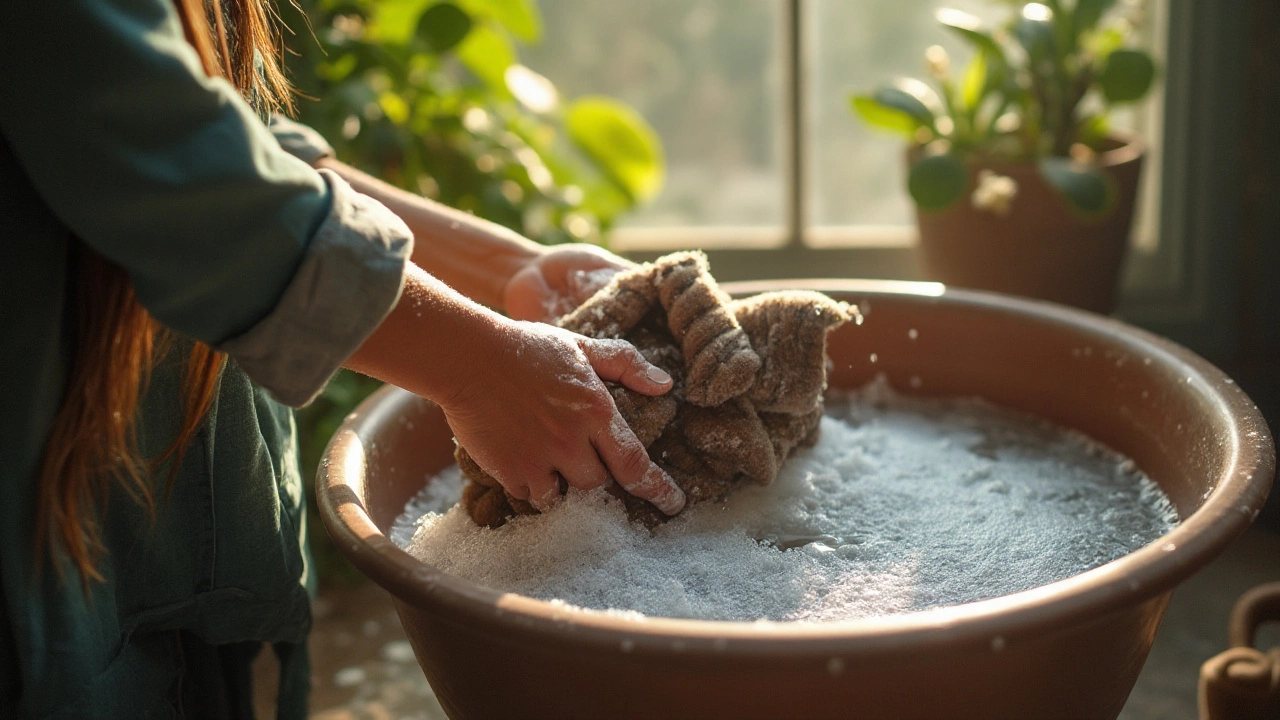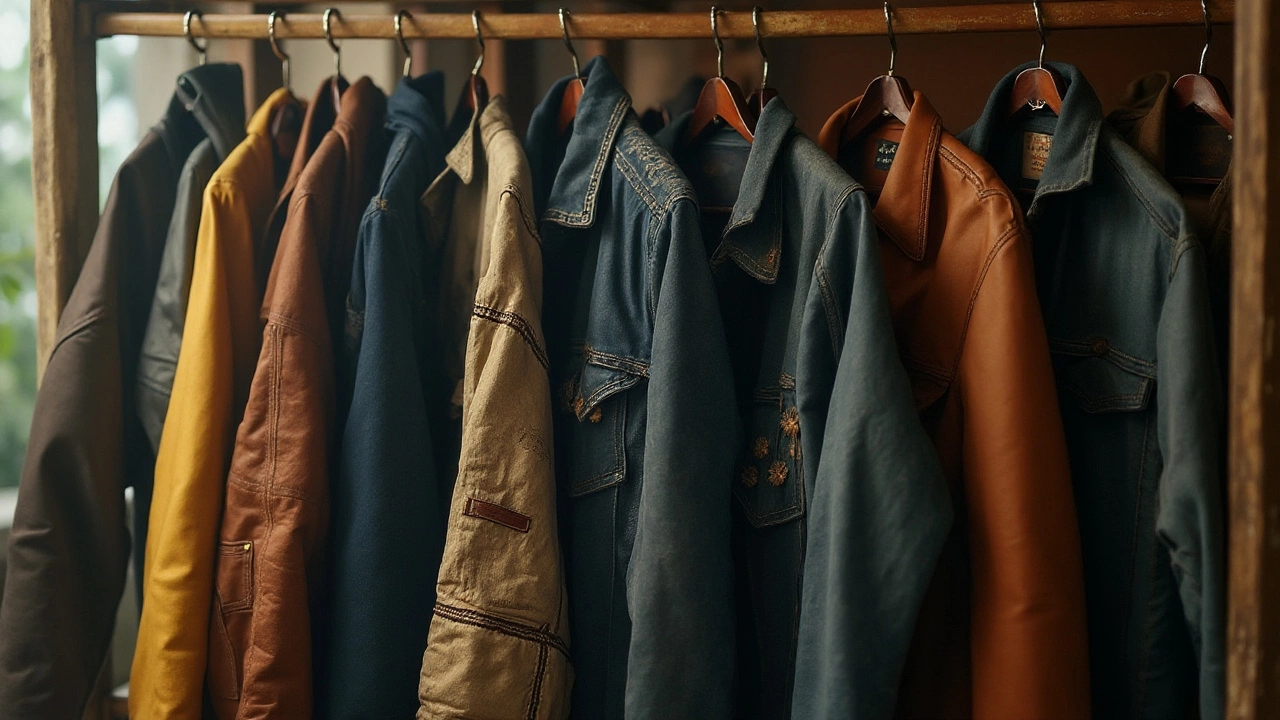Taking care of your jackets is more nuanced than just tossing them in the laundry. Not all jackets are cut from the same cloth, figuratively and literally. Whether you're flaunting a leather bomber or staying cozy in your winter parka, understanding your jacket's material can make a big difference in its upkeep. With the right knowledge, you'll keep them looking fresh and extend their lifespan without washing them unnecessarily.
But how often should a jacket take a spin in the wash? The answer isn't as straightforward as one might think. It relies on factors like the type of fabric, how frequently you wear it, and how dirty your environment is. Learning these elements can guide you in crafting the perfect cleaning schedule for your outerwear.
Let's dive into a world where fashion and practicality meet. This guide is packed with advice on caring for your beloved layers, debunking some myths you've probably heard, and knowing when DIY isn't enough, and it's time to hand over your coat to the professionals.
- Understanding Different Jacket Materials
- How Often Should You Wash Your Jackets?
- Practical Maintenance Tips
- Common Myths and Facts About Jacket Care
- When to Seek Professional Cleaning
Understanding Different Jacket Materials
When it comes to jacket care, not all fabrics are created equal. From the rugged durability of denim to the elegant drape of cashmere, each material brings its own set of maintenance needs. Jacket care starts with a solid grasp of what your garment is made of, which will inform the entire cleaning process. Not only does the fabric dictate how often you should wash your jackets, but it also guides you on what products and techniques will work best.
Take leather, for instance. This material is a living, breathing entity that evolves with time. Leather jackets require regular conditioning rather than frequent washing. Treating it with specific leather care products keeps it supple and protects it from cracking and damage. Unlike cloth fabrics, leather is more about maintenance than cleansing. It's wise to wipe it down with a damp cloth periodically and apply a leather conditioner to maintain its sheen and texture.
On the other hand, we've got synthetic materials like polyester or nylon which often make up our rain jackets or windbreakers. Designed to withstand the elements, these materials can usually handle more frequent washing without losing their protective qualities. Giving them a gentle wash in cold water can often suffice. An interesting fact is that both nylon and polyester have relatively low absorption rates, meaning that they don't retain much water, which often helps them dry faster than natural fibers.
Now, let's talk about wool. Woolen jackets are the epitome of classic winter style but come with delicate care requirements. Wool tends to repel dirt up to a point, so frequent washing isn't necessary. Instead, shaking it after wear and spot cleaning are highly encouraged. If it needs a full clean, it's often best to choose hand washing in cool water or entrust it to a dry cleaner, especially with high-grade wool varieties.
"The finest clothes, as the finest diamonds, require delicate care to maintain their finest condition." — Fabric Care Specialist
Not to forget the soft, luxurious embrace of down or feather-filled jackets, largely prized for their warmth without bulk. When it comes to washing them, periodic washes are suggested to maintain their loft. However, improper cleaning can cluster the down, reducing insulation capacity. It's highly recommended to use a washer with a gentle cycle along with a down-specific detergent, and dry it with clean tennis balls to maintain its fluffiness.
Common Fabrics and Care Guidelines
- Cotton: While sturdy, cotton can shrink with frequent washing. Stick to cold water, gentle cycles, and air drying to keep them looking sharp.
- Denim: Often requires minimal washing; some purists suggest washing every six months to retain fit and color.
- Faux Fur: Prefer hand washing with a mild detergent to preserve its appearance.
The takeaway here is that your jacket's material plays a critical role in shaping its care routine. By understanding these varied needs, you can preserve the lifespan and quality of your favorite jackets — keeping them ready for any occasion life throws your way.
How Often Should You Wash Your Jackets?
Jackets are unique in the clothing world; they toggle between function and fashion, all while serving as a trusty shield against the elements. How often you wash a jacket largely depends on its use, the material, and sometimes even the current climate. If you wear a jacket daily, especially through dense urban environments or during a rigorous workout, it certainly demands more frequent cleaning compared to one that's only slipped on for special occasions. However, the key here isn't simply a rule of thumb but a keen understanding of how each factor affects your jacket's cleanliness and condition. For instance, jackets made from natural fibers like wool might not require frequent washes since wool naturally repels dirt and odors. Conversely, synthetic materials might hold sweat and smells more readily, necessitating a more regular cleaning routine.
When you think about jacket care, frequency isn't the only puzzle piece; understanding the nuances of your jacket's fabric is just as crucial. Consider your waterproof, rugged outerwear; while these garments resist the heaviest downpours, frequent washing could deteriorate their protective coatings, ultimately making them less useful. On the other hand, your gym-friendly track jackets might deserve a spin in the washing machine more regularly, especially if you work up a sweat routinely. Delicate items, such as silk blazers, definitely require a gentler approach, often needing nothing more than spot cleaning or professional attention. It's all a balancing act of preserving quality while ensuring garment hygiene.
Some industry experts recommend a seasonal washing schedule for standard wear jackets, which generally maintains their looks and lifespan. Every garment, much like its wearer, comes with its own story, its own needs. "It's about the little details," says Elena Jacobs of The Sustainable Fashion School.
"Every jacket tells a tale of its adventures. Knowing when to wash it preserves both its narrative and its function."This insight can be quite helpful in navigating the complex world of garment care, where every step influences both sustainability and style.
If you're still unsure about whether or not to throw your jacket into the wash, here are some signs. Regularly check for visible dirt or mysterious stains, and sniff for lingering odors that a simple airing out can't fix. A jacket that feels heavily soiled or just emits an undeniable smell is a prime candidate for cleaning. Tracking use and exposure can be your guiding compass for when a jacket washing is due. Monitor your habits, the jacket's environment, and wear patterns, and you'll become adept at anticipating its laundry needs without unnecessary measures. Attuning to these signals ensures your stylish outerwear upholds its form and function for many seasons to come.

Practical Maintenance Tips
Keeping your jackets pristine between washes hinges on adopting smart, practical maintenance habits. A little love and attention can dramatically extend the life of your favorite outerwear pieces. First and foremost, you should always check the care label. It provides essential guidelines specific to your jacket's fabric. Ignoring these instructions can lead to damage, shrinking, or a drastic change in texture. For most jackets, air-drying is preferable, as direct heat can warp and weaken fibers.
Regular airing out your jackets is an underrated but highly effective practice. Hanging them in a well-ventilated area can help dispel odors and freshen them up. When your jacket seems slightly wrinkled or has retained creases from storage, avoid using a traditional iron. Instead, use a garment steamer to relax the fibers without direct pressure, which can leave shiny marks. For leather jackets, applying a leather conditioner every few months maintains suppleness and guards against cracking.
Spot cleaning is an unsung hero in reducing unnecessary washes. Investing in a gentle, jacket-appropriate detergent for hand-cleaning stained sections ensures that you only tackle the grime without compromising the piece's integrity. *Laundrapp*, a known brand in clothing care, suggests,
"Targeting small areas rather than subjecting the whole jacket to a wash helps preserve the fabric’s natural oils and coatings."Always dab, never rub, as aggressive motions can set the stain deeper into the fabric fibers.
Storing your jackets correctly is another cornerstone of good maintenance. Hang them on sturdy, padded hangers to keep their shape intact. Avoid wire hangers that can cause distortions or indentations. If closet space is an issue, roll jackets loosely and store them in breathable garment bags to protect them from dust and pests. Cedar balls or sachets repel moths without harsh chemicals that can leave residual deposits on your clothing.
Understanding and managing environmental exposure is crucial for jacket care. Harsh elements like rain, direct sunlight, and pollution can degrade materials faster. If you get caught in the rain, allow your jacket to dry naturally at room temperature. Avoid twisting or wringing it out, especially with delicate fabrics like wool or down. A weatherproof spray can offer an added shield, especially for jackets worn in inclement weather. These sprays create an invisible layer that repels moisture and stains, albeit requiring periodic reapplication.
Common Myths and Facts About Jacket Care
Caring for jackets can sometimes feel like navigating a maze of dos and don'ts. It's not just about preserving the color or ensuring the fabric's longevity; many people have been swayed by myths that make jacket care seem more complicated than it really is. One common myth is that jackets should be washed after every wear. While this might be true for lightweight clothing, jackets, particularly those made from delicates like wool or leather, can often go several wears before needing a clean. In fact, overwashing can not only wear down these materials but also strip away their natural oils and finishes. For instance, leather jackets thrive when simply wiped down with a damp cloth and air dried rather than subjected to frequent washing.
"The natural oils in leather, which provide it with structure and durability, can be depleted with every wash," says a renowned fashion technical designer.
Another myth that tends to circulate is the supposed magical effects of dry cleaning. It’s easy to think dry cleaning is the cure-all for all your jacket woes, but the truth is more nuanced. Many believe that taking their jackets to a dry cleaner guarantees perfect cleanliness without any drawbacks. However, excessive dry cleaning can actually lead to fabric degradation over time due to the harsh chemicals used in the process. Thus, it should only be reserved for special occasions, and your jackets should typically be aired out and spot-cleaned after wear.
Additionally, there exists a widespread notion about the necessity of using fabric softeners for jackets, particularly heavy-duty ones like parkas. While fabric softeners are often marketed as a go-to solution for keeping clothes soft, they can actually harm certain jacket materials such as fleece or technical fibers. These softeners can coat the fibers, reducing the fabric's breathability and water resistance, characteristics often essential in jackets used for outdoor activities. It's these small details that are crucial for maintaining the performance and durability of your jackets over time. Paying close attention to such facts, rather than relying on assumptions or marketing, can save you time, money, and hassle in the jacket maintenance game.

When to Seek Professional Cleaning
We all love doing some DIY at home, but there comes a time when even the most seasoned laundry enthusiast should consider handing their beloved jacket to an expert. Knowing when to seek professional help is essential to preserve your jacket's integrity and longevity. So, when exactly is that time? It often depends on the type of material, and the presence of stubborn stains, or if your jacket is made with complex fabrics that are difficult to clean at home. For instance, jackets made of leather, suede, or those with intricate details and embellishments are best cleaned by professionals to avoid damage.
One significant reason to opt for expertise is the presence of materials like leather and suede. These require special treatment that typical home-cleaning detergents can't provide. Professional cleaners have access to the appropriate solvents and methods to clean them without stripping away natural oils that keep these materials supple. Moreover, for jackets with down filling or complex quilting, the risk of clumping and uneven distribution post-wash is high if you're not using commercial-grade dryers and techniques. They can carefully handle these materials to ensure your jacket remains in perfect shape.
Sometimes, a jacket may have weather sealing features or water-repellent coatings that can be compromised by washing at home. Specialists are equipped to maintain these finishes. Moreover, tough stains, like wine or grease, are also best left to the professionals. These stains, if handled incorrectly, can set permanently, ruining your jacket. Seek professional services if you're unsure of your capability to remove such marks.
According to John Mayer, a textile expert from Fabric Care Professionals, “Professional cleaning not only removes dirt and stains but also maintains the jacket's appearance and functionality significantly longer.”
For jackets that carry sentimental value or for which cost was considerable, the risk is not worth the reward. It's crucial to preserve the fabric's ability to keep you warm or dry, especially if it's designed for those purposes. Pro cleaners have the machinery and know-how to handle this expertly. Always look for those establishments that have certification from reputable organizations, ensuring that your garment will receive the care it deserves.
